![]()
A frequently quoted line in Shakespeare says that “all the world’s a stage.” If you’re a performer, whether in dance, music or acting, the stage really is your whole world. Whether you were born to act, dance, or sing, you probably couldn’t imagine living without the audience, the spotlight, and the magic of performing. Performers usually fall in love with the stage at a young age, and have a combination of drive, vision, and raw talent. But formal training is required to turn those natural traits into professional skills.
Whether you see yourself starring on the big screen, or playing along with the group in a symphony orchestra, a performing arts education is essential. Work in creative fields is notoriously hard to come by, and understanding how to excel in the craft, and how to navigate the professional performing arts world, is crucial for success. A degree in preforming arts provides budding actors, dancers, and musicians with the knowledge, training, and connections they need to get ahead in this tough, vibrant, and deeply fulfilling world.
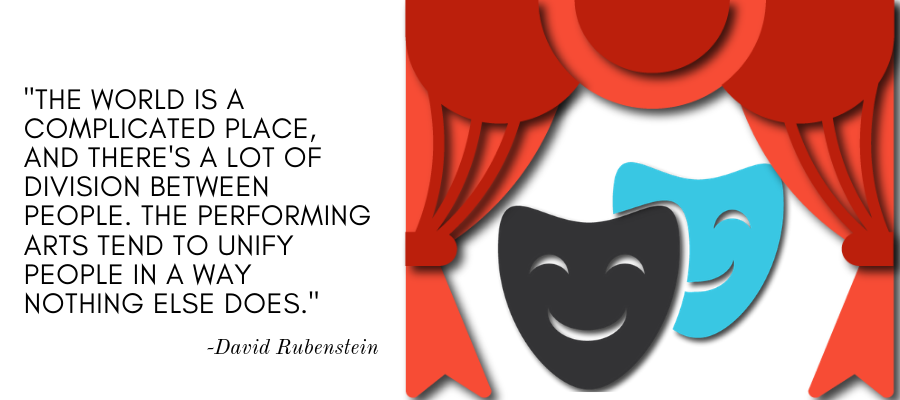
Jump To:
- What is Performing Arts?
- What is a Performing Arts Degree?
- What’s the Difference Between a BA and a BFA in Performing Arts?
- What Classes Will I take for a Degree in Performing Arts?
- What Can I Do with a Drama Degree?
- What Can I Do with a Music Degree?
- What Can I Do with a Dance Degree?
- What are the Pros and Cons of a Degree in Performing Arts?
What is the Performing Arts?
Performing is as old as humankind, and is a powerful part of what makes us human. Anthropologists have found that even our cave-dwelling prehistoric ancestors engaged in performances. Written records of formal dance, music, and drama date back as far as 2000 BC in ancient Egypt, and instruments made from mammoth bones dating back 43,000 years have been found.
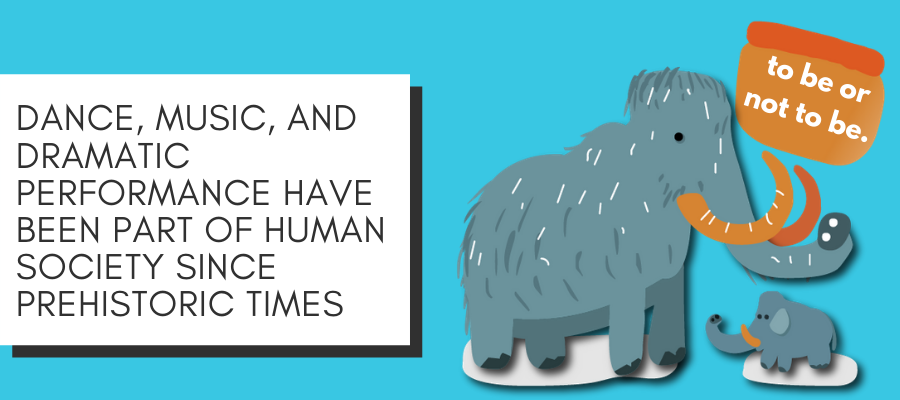
The performing arts are an art form, but one which does not use art materials like paint or clay, and which does not produce a tangible artifact, such as a sculpture or tapestry. Instead, “performing arts” is defined as a form of art in which artists use their bodies, voices, or inanimate objects for artistic expression. Performers may use puppets, instruments, masks, laser lights, or costumes. Some performers, such as stand-up comics, dancers, and singers, use only their bodies to produce live entertainment. Other performers use extensive props, devices, and sets, and may record and edit or manipulate their performances to create new works of art.
The forms of performing art found worldwide are literally countless, from shadow puppetry to improv comedy. Some of the most well-known forms of performing arts include:
- dance
- music
- theatre
- opera
- musical theatre
- magic/illusion
- pantomime
- spoken word
- puppetry
- circus arts
- performance art
Associated with the performing arts are a number of supporting roles and activities. For instance, in theater, professionals are needed to direct plays, choreograph action, manage props, create sets, make costumes, design makeup, work lights, and work sound systems. Outside of the performance, associated professionals handle publicity, manage performance spaces, write scripts, apply for funding, and book performances. Each individual involved must have an understanding of their specific area of expertise, as well as an understanding of the performance as a whole.
What is a Performing Arts Degree?
You don’t need a degree to work in the performing arts. Self-taught dancers, musicians, and actors have always existed. Some performers take classes at a non-accredited school, enroll in workshops, or take some college classes without ever getting a degree. Some learn dance, drama, and music by studying under another performer. But the majority of people in the professional world of dance, drama, and music have formally studied at some point or have a degree in performing arts.
A performing arts degree can mean a degree in music, a degree in art, a degree in drama, or an interdisciplinary performing arts degree that combines studies in all of these areas. A performing arts degree blends theoretical study with performance practice. How much time is spent on academic study versus practicing craft will depend on your choice of school and choice of program. Fine arts degree programs focus on developing a student’s craft, from the history and theory of performing arts to their mastery of the medium. Liberal arts programs have a broader curriculum, with more general education requirements in fields like science, English, and history.
In addition to classwork, most performing arts degrees require students to complete either research or field experience. This often takes the form of an internship, where students can work in a real-world industry setting, such as a recording studio, under the supervision of a dedicated professional. This is an excellent opportunity to gain real experience, build a resume, and develop contacts in the performing arts world.
A BA or BFA in the performing arts is the most common degree level found in the field. Master’s degrees in performing arts are also available for those who want to advance their expertise or to move into teaching at the college level. Those few who plan to become researchers or tenure-track professors can even earn a PhD in performing art.
What’s the Difference Between a BA and a BFA in Performing Arts?
The terms “liberal arts” and “fine arts” can be very confusing, especially in the context of performing arts. When most people hear the term “fine art,” they think of the visual arts- painting, sculpture, ceramics, and so on. In the context of education, Fine Arts the formal study of both the visual and performing arts as a professional discipline, with a focus on developing craft. Where college education is concerned, “performing arts” falls under the heading of “fine arts” right along with the visual arts like painting and sculpture. Degrees in the performing arts are offered as a Bachelor of Fine Arts (or BFA). A BFA degree is all about developing an understanding of either dance, drama, or music, with classes covering theory, history, and practice, as well as professional development. About one-third of the curriculum in a BFA in performing arts will be liberal arts (English, math, science, history, psychology etc.).
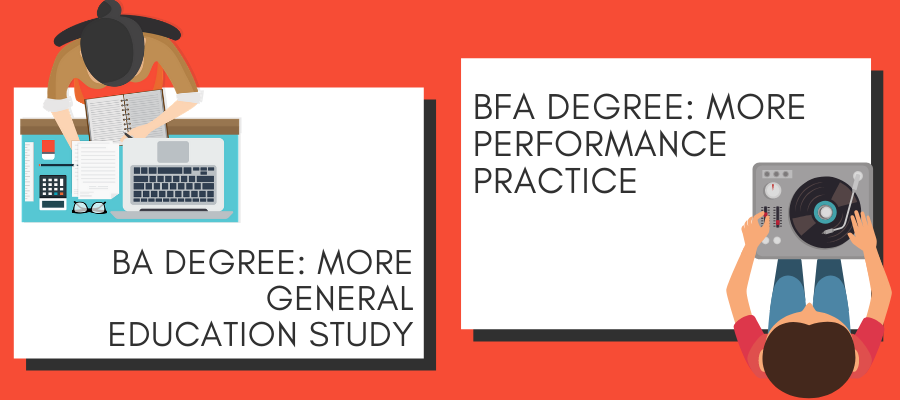
It’s also possible to earn a liberal arts degree with a major in performing arts. A liberal arts degree is broader, with general education requirements alongside classes in the performing arts major. About two-thirds of the curriculum for a BA in performing arts is dedicated to liberal arts requirements. Many schools offer both BAs and BFAs in performing arts.
There are benefits and drawbacks to both degree types. Most people who are drawn to drama, dance, and music want nothing more than to perfect their craft and rise to the top in their art form. A BFA offers the chance for students to deeply immerse themselves in the world of theater, music, or dance, to push their limits and realize their potential as a performing artist. On the other hand, a BFA degree has a narrow focus, and is not widely applicable outside the world of the fine arts major. Graduates with a BFA in performing arts can struggle to find satisfying and stable work if they’re not able to land one of the few jobs in the performing arts profession. A BA has a broader focus; outside the performing arts major, the liberal arts curriculum is meant to develop well-rounded knowledge and critical thinking. With a BA, graduates will generally have more job options outside the performing arts field, or find it easier to land jobs in the administrative side of performing arts (such as grant writing or publicity).
What Classes Will I take for a Degree in Performing Arts?
The courses you take in a performing arts degree program will differ based on whether you plan to earn a degree in music, drama, dance, or an interdisciplinary performing arts degree. Classes will differ by school and by degree level as well. As we’ve discussed above, another big factor is whether you choose to pursue a fine arts degree or a liberal arts degree with a performing arts major.
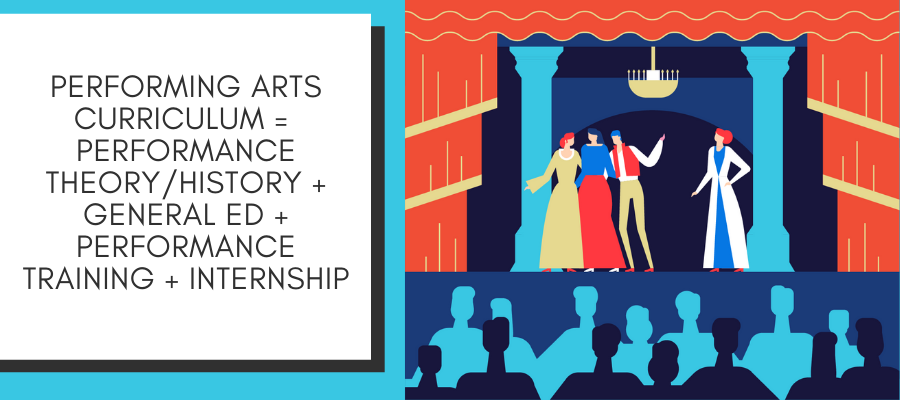
Broadly speaking, a performing arts degree will have general education classes, lecture-based academic classes on the history and theory of the performing arts, practice-based applied classes on the perfuming arts craft, and field-based experiential learning. A performing arts degree will also usually include some electives, allowing you to specialize in a specific area of study (such as contact improvisation or jazz) or broaden your studies with classes outside the department (such as courses in business or psychology).
Some of the class titles offered in performing arts include:
- Theatre, History, and Culture
- The Play: Structure, Style, Meaning
- Stage Design
- Modes of Acting
- Introduction to Directing
- Music Theory
- Ensemble
- Music Performance
- Music and Technology
- Dance Improvisation
- Choreography
- Movement Awareness
- Rhythmic Skills
- Production
What Can I do with a Drama Degree?
A drama degree is perhaps the most flexible of any degree in performing arts. With a drama degree, you can go into a number of careers in the dramatic arts, as well as outside roles that require strong communication skills and the ability to engage an audience. The Guardian reports that “
Plenty of famous actors and actresses earned degrees in drama or degrees in performing arts, including Judi Dench, Denzel Washington, Zac Efron, Jessica Chastain, and Meryl Streep. With the high level of training in acting provided in a drama degree program, you’ll be able to bring your A-game to the competitive world of professional acting, whether on stage or on screen. But it takes more than actors to put on a show, and a drama degree also provides a good background for other roles related to dramatic performance. Jobs in the dramatic arts include:
- Stage actor
- Film/TV actor
- YouTuber
- Director
- Stage manager
- Set designer
- Propmaster
- Casting director
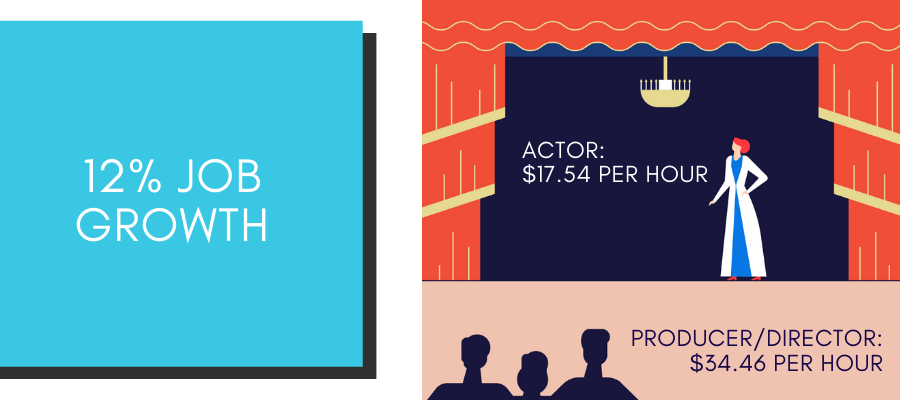
Beyond developing a student’s acting craft, a drama degree or performing arts degree develops skills in self-presentation, confidence, teamwork, public speaking, self-discipline, and the ability to think on your feet. All of these skills are vitally important in jobs where charisma, communication, collaboration, and flexibility matter. Employers outside the acting world value these skills highly, since these “soft skills” are harder to learn in a traditional academic setting than “hard skills” like tech literacy. Jobs outside the dramatic arts world for those with a degree in drama or performing arts include:
- Radio host
- News anchor
- Drama therapist
- Moderator
- Media specialist
- Marketing account manager
- Team building coach
What Can I do with a Music Degree?
People need music, period. Whether you’re at a wedding or on hold with customer service, there’s sure to be music playing. Musicians are needed to create music for live events, commercial broadcasts, and recorded entertainment. To succeed in the world of professional music, you’ll need to have talent, expertise in performing, teamwork, communication skills, and industry connections. Musicians need to be entrepreneurs as well as artists- having a bit of hustle is essential to landing gigs, tours, and commercial assignments. Musicians can find work performing and recording for:
- live concerts
- festivals
- weddings and events
- cruises
- worship services
- recorded music sales
- film and TV scores
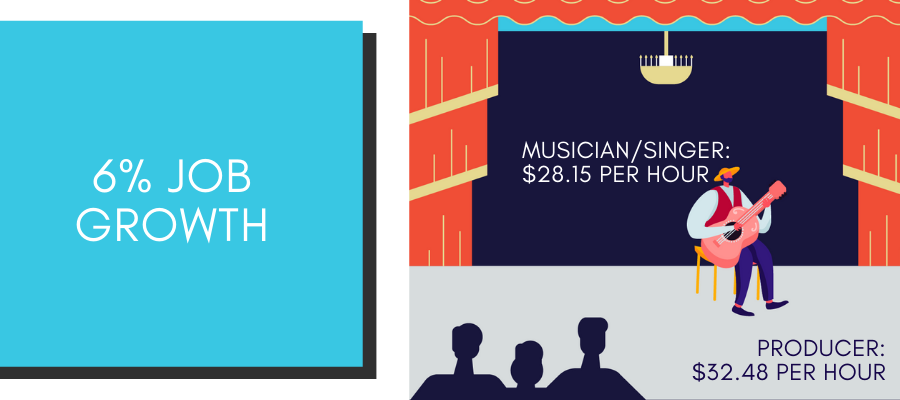
You don’t have to the one on stage to be part of the world of professional music, though. As the Student Research Foundation notes, graduates with a music degree can use their knowledge of sound, music history, and the music industry to work in a number of related jobs. Needless to say, a large proportion of musicians take on more than one of these roles. For instance, many music teachers also play with a band, and take on gigs or even tour outside of their regular teaching schedule. Graduates with a degree in music are qualified for positions in the music industry such as:
- Musician agent
- Band manager
- Music Production
- Festival organizer
- Music blogging
- Broadcast engineering
- Music education
- Music therapy
- Conservatory administration
- Music arranging
- Instrument and equipment sales
If you hold a degree in music and decide to take on work in an outside field, you can leverage the organization, communication, and cooperation skills you’ve learned through formal music training to find poisons in the private sector, such as:
- Media specialist
- Event planner
- Editor
- HR specialist
- Grant writer
What Can I do with a Dance Degree?
Most dancers have a grasp of many modes of dance, from tap and tango, to jazz and modern dance, along with a particular style in which they naturally excel. A dance degree provides training in dance theory and history, studies in movement, injury prevention, choreography, performance practice, and both independent and group dance. Needless to say, dancers must continue to actively train and practice long after they have graduated in order to stay in stage-ready condition.
In the professional world of dance, just as in the dance studio, people with a degree in dance need to be flexible. Only a small proportion of those with a degree in dance go on to be professional performers. Of those, the most common roles are:
- Ballet dancer
- Belly dancer
- Modern dancer
- Choreographer
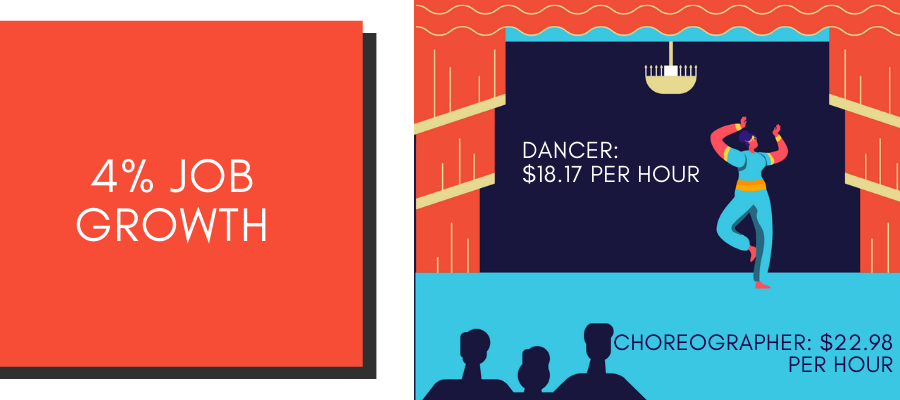
It’s no secret that funding for the performing arts is seriously limited, and even professional dance jobs may not be enough to support oneself. Most professional dancers work at least part-time in other roles, usually related to dance. In fact, Dance Magazine points out that non-dance work in the dance industry can help some performers grow professionally and strengthen certain stage-relevant skills, like self-presentation. Some of the most common off-stage dance jobs include:
- Dance teacher
- Dance studio manager
- Yoga or pilates instructor
- Personal trainer
- Costume designer
- Physical therapist
- Dance therapist
If you decide to leave the world of dance, at least as far as paid work, it’s still possible to put the training from a performing arts degree program to work. Some of the skills taught in a dance degree include teamwork, leadership, planning and project management, physiology, self-confidence, and both verbal and nonverbal communication. Those with a degree in dance will be strong candidates for jobs where collaboration, planning, and having a stage presence matter. Some of these areas include:
- Arts administration
- Team building
- Event planning
- Health education
- Activities coordination
- Massage therapy
What are the Pros and Cons of a Degree in Performing Arts?
People choose a degree in music, dance, or drama because they love the performing arts, and care deeply about doing what they love. In a field that’s high in passion and low on resources, there are some simple- but intense- pros and cons.
The main drawbacks of a performing arts degree are scarce job openings, low job security, and low salary. Simply put, there are few full-time professional jobs on the stage. More often than not, people with performing arts degrees need to take on work (at least part-time) in supporting roles, such as sound production or prop managing. Many others have day jobs teaching in their area of expertise, either in secondary or post-secondary schools. Unfortunately, funding for the performing arts is both limited and subject to cuts when the economy wavers. That means jobs in dance, drama, and music tend to pay very modestly, and are not secure. In addition, many performers are freelancers, meaning that much of their work involves finding work, and they can’t rely on an employer for payroll tax or benefits.
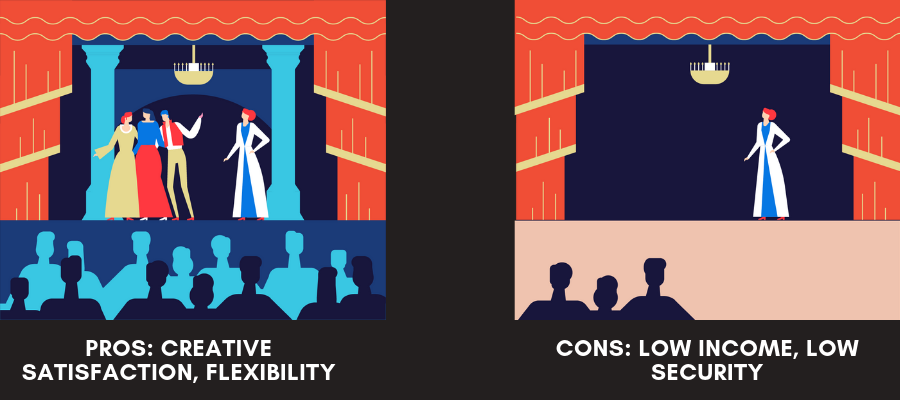
The main benefits of a degree in performing arts are the opportunity to pursue one’s passion, the chance to develop a community, and professional flexibility. Many people who work in the performing arts are able to embrace the lack of security, moving flexibly between freelance positions, one-time gigs, performance instruction work, and day jobs. As The Balance Careers recently observed, Americans switch jobs 12 times during their career on average. With such low job security in non-arts positions, a career in the performing arts seems like less of a relative gamble.
A job in dance, music, or drama also offers the opportunity to connect with a community of like-minded creatives around a shared love of the medium. The relationships formed in a creative community are bound to be more lasting and meaningful than those formed with coworkers in a traditional office environment. Dance, music, and dramas connect people in a way that few other activities can. Finally, and most importantly, a degree in performing arts offers the opportunity to follow your bliss, allowing you to realize your potential in the medium that matter the most to you.
Further Reading:
- 10 Creative Careers That Won’t Require You to Be a Starving Artist
- What are the 5 Best Careers in Environmental Science?
- What Can I Do With an Art Degree?
- What Degree Do I Need to Be a Music Producer?
- What Jobs Can I Get With a Bachelor of Fine Arts Degree?
- What Can I Do With a Degree in Music?
- What Degree Do I Need to Become a Lighting Designer?
- Top 15 Liberal Arts Schools in America
- What can I do with a degree in Recreational Therapy?
- What Degree Programs Can I Major in at a Liberal Arts School?
- What Are My Degree Choices to Be a Film/TV Producer?
- How to Become a Personal Trainer: What Degree Should I Get?
- 50 Best Online Degrees for 2019
- 100 Most Affordable Online Colleges & Degrees 2019
- 23 Fastest Online Bachelor’s Degree Programs
- 20 Best Degree Programs for Undergraduates
- Top 25 Fastest Online Doctorate Degrees
